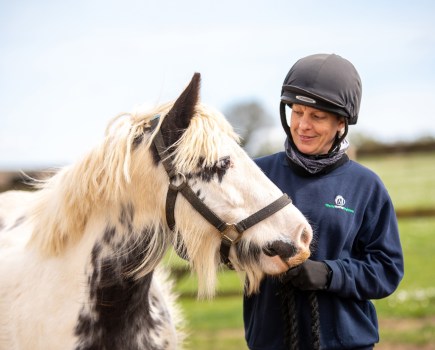An equine sports therapy and rehabilitation graduate hopes winning the 2021 BETA Equine Thesis of the Year competition will help inspire others who have to re-take a year of their studies.
Isabelle Anderson, from Chelmsford in Essex, represented Writtle University College in the final (31 October) to claim the award for excellence in undergraduate study.
Isabelle said the win was “something really special” to put on her CV and added that she hoped her success would inspire other students.
“I felt embarrassed at the time [of re-taking a year], but I now feel happy that it was the right thing to do,” she said.
“I’m surprised but over the moon at having won. Thank you to my lecturers Briony Witherow and Rosa Verwijs, I really couldn’t have done it without them.”
Isabelle was one of four finalists to present her thesis to a panel of judges, watched by an audience of academics and industry figures.
Shared decision-making
Her winning study, ‘Owner satisfaction with rehabilitation practices for chronic sacroiliac pain in equines in the UK since the year 2000’, revealed often variable collaboration between “the valuable triad” of horse owners, vets and paraprofessionals, such as chiropractors.
“Further and larger studies into veterinary-client-paraprofessional relationships could improve equine rehabilitation and welfare by highlighting communication barriers and challenges,” she said.
The popularity and effectiveness of exercises such as carrot stretches, pole work and hill work, along with training aids, for horses with sacroiliac pain were also analysed.
Runner-up Isabel Badham graduated from Harper Adams University and researched, ‘The effect of different water depths on the activity of the equine longissimus dorsi muscle while walking on a water tread mill.’
Field trials with racehorses examined whether altering water depth promoted a difference in activity on the left and right sides of this major back muscle.
The other finalists were Sophie Avery, who graduated from The Royal Veterinary College, with her thesis ‘Risk factors for equine glandular disease associated with general management and husbandry of domesticated horses.’
And from the University of Limerick, Rebecca Dillon, who presented ‘An evaluation of racehorse performance using the speed gene test and the dosage system.’
Bringing research to life
The judging panel was headed by research consultant Dr Georgina Crossman with equine nutritionist Katie Williams, vet Karen Coumbe and Equestrian Trade News editor Liz Benwell.
“The standard of dissertations submitted this year was very high, and the finalists really brought their research to life through their presentations,” said Dr Crossman.
“As a judging panel, we felt the finalists were all excellent ambassadors – articulate, intelligent and with a passion for their subjects”.
“Isabelle Anderson’s dissertation was well structured with a clear research method, and her presentation highlighted the need for shared decision making when considering horses with chronic sacroiliac pain.”
Exciting future
The four finalists were chosen from the original entries by a preliminary panel.
Claire Williams, BETA executive director, said the quality of work put forward bodes well for the future of the equestrian industry.
“BETA took on the Thesis of the Year competition to promote the abilities of graduates coming through, to give them a showcase and a platform from which to jump into future careers,” she said.
“This year’s entries have proven we’re in a good place with such young talent coming into our industry. All four finalists can be very proud of what they have achieved.”









